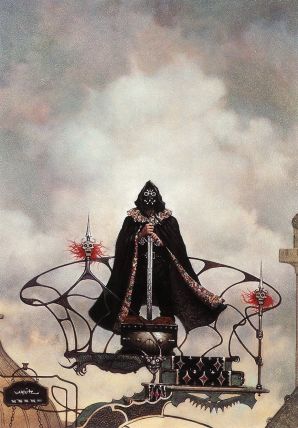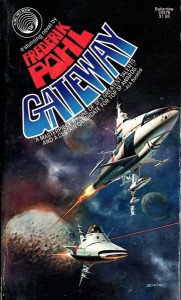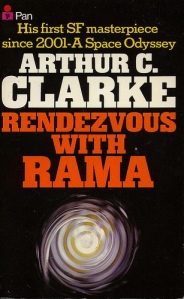 This is a 5500 word essay on a reread of TBotNS, focusing on the narrative trap Wolfe has set, and my theory that his literary sleight of hand serves a religious/mystical goal, much more than it is the supposed puzzle for the reader to unravel. There’s also a short section on free will, and it ends with my overall appraisal of the book’s enduring appeal.
This is a 5500 word essay on a reread of TBotNS, focusing on the narrative trap Wolfe has set, and my theory that his literary sleight of hand serves a religious/mystical goal, much more than it is the supposed puzzle for the reader to unravel. There’s also a short section on free will, and it ends with my overall appraisal of the book’s enduring appeal.
The first time I read The Book of the New Sun must have been somewhere in 2011, and it has remained a strong favorite in my mind ever since, easily top 5 ever. As The Folio Society recently published a more or less affordable version of their limited edition treatment of the book, I decided that was a good excuses to whip out too much cash on a book I already owned, and reread the entire thing.
Much has been written about Gene Wolfe’s magnum opus, and I have no intention whatsoever to add to certain debates surrounding these volumes – on the contrary: to me these debates miss an important point, as I will try to explain later.
Deep down I was reluctant to start the reread. My other encounters with Wolfe’s prose haven’t always been fully successful, and I feared The Book of the New Sun to be a lesser affair than I remembered. I have to admit that to a certain extent is was – but that is not to say it became a bad book: I still rank it among my favorite reads.
Before I’ll get to the bulk of this review, first some introductionary remarks to those unfamiliar with the book.
The Book of the New Sun was first published as 4 separate volumes: The Shadow of the Torturer (1980), The Claw of the Conciliator (1981), The Sword of the Lictor (1982) and The Citadel of the Autarch (1983). Two volume editions have been published as Shadow & Claw and Sword & Citadel, and single volume editions have been published as The Book of the New Sun, and also as Severian of the Guild.
When I started rereading it, I intended to review only The Shadow of the Torturer, and then turn to some other books before starting the second volume. But it quickly dawned on me such a review wouldn’t do the novel justice. A review of Shadow might have worked if it had been my first read, but since my memories of the other volumes – not perfect, mind you – had such a gravitational pull, I could only finish the entire thing before writing this. That is not unlike Wolfe himself, who intended to write a novella, but when is was done it turned out to be a tetralogy, only finishing the final draft of the first book when he had finished the second drafts of the remaining 3 parts.
Because he was pressured by his publisher, Wolfe published a coda to this story in 1987, The Urth of the New Sun. I will reread that too someday, but I feel I shouldn’t take it into account for this review, as Wolfe didn’t conceive of it while he wrote this. The same goes for the two related series The Book of the Long Sun and The Book of the Short Sun – published between 1993-1996 and 1999-2003. I won’t take their subject matter into account either: they weren’t part of the quadruple canon, and as such can’t really be used to weigh the original artistic merit. I feel that lots of the interpretations of TBotNS based on certain things in the later series could be considered a form of Hineininterpretierung.
Those who dread being sucked into a 12 book ‘Solar Cycle’, such fear is unwarranted. The Book of the New Sun was conceived as a stand-alone, and if you like it a lot, there’s no harm in reading the coda, Urth. But Long Sun and Short Sun are generally considered works of lesser quality – except by hardcore Wolfe fans – and their main stories are only very tangentially related. I’ve read the first 3 of Long Sun (reviews here), but chances are I’ll never start its final book.
The Book of the New Sun is a dying earth novel, set on Urth, a far-future version of Earth, or an Earth before our own, in some different time cycle. It’s a world that has lost most scientific abilities, and resembles a society straight out of a fantasy novel – even though remnants of technology exist, and certain of the upper classes still have access to flying ships. In the backdrop of the story, there are aliens that try to enslave humanity, and yet other aliens that want to help our race to revive the sun, which has dimmed to such an extent stars are even visible by day. The moon’s light is green, as it has been terraformed in the past, but humans forgot when and how, and can’t get there anymore.
It is the first-person narrative of Severian, a young man belonging to the guild of the torturers – “The Order of the Seekers of Truth and Penitence”, who is disgraced and exiled, and ultimately “backs into the throne” seemingly by accident, and turns out to be something of a messiah. Like in other works by Wolfe, Severian is an unreliable narrator, but more on that in a minute.
The Book of the New Sun is considered by many as one of the towering achievements of science fiction or science fantasy, and I’ve read serious people putting it on the same level as Ulysses and À la recherche du temps perdu. It won lots of awards, and tends to be found near the top of many lists of best speculative fiction. Word has it that this weird and strange book can only be fully understood after three readings.
So what to write about this illustrious work?
I will talk first about its religious themes – Wolfe was a devout Catholic – and how the question whether this book can be enjoyed by agnostics or atheists too ties into the trap that Wolfe has set, a trap that has ensnared many of those writing New Sun exegesis on message boards, Facebook groups, mailing lists and Reddit.
As an intermezzo, I’ve written a short passage about Severian’s outlook on free will, and I’ll end with some thoughts on my rereading experience, and my current appraisal of New Sun – will I read it a third time?
This entire text is spoiler free.
Continue reading →
 Just a short review this time.
Just a short review this time.









